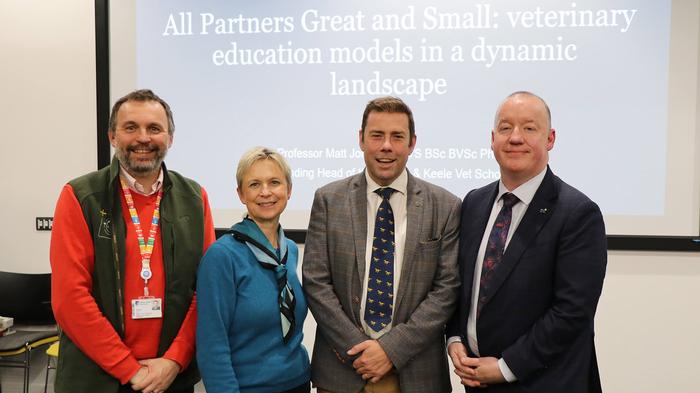Harper & Keele Vet School Head’s First Lecture Discusses Partnerships in Veterinary Science
The challenges facing the UK veterinary education sector – and how the Harper & Keele Veterinary School (HKVS) has evolved to tackle them – have been explored in an inaugural lecture.
During his inaugural lecture as the founding Head of the Harper & Keele Veterinary School, Professor Matt Jones discussed the issues facing the profession, how these feed into the UK veterinary education sector’s approach – and examined how the School has evolved to create a sustainable and agile model built on strategic partnerships.
Professor Jones said: “HKVS offers a unique model of veterinary education built on the ambitions of two universities. Our founding ethos of combining the excellence of two established, successful universities, each with the necessary and complementary components to create a vet school, has proved to be a great foundation.”
Referencing research exploring the advantages and disadvantages of the four broad categories of existing veterinary education models – ranging from the traditional university owned teaching hospital to a fully distributed model, Professor Jones continued. “Being a new School, we also had the good fortune to be able to learn from those who have broken new ground in the field.
“Drawing on this research and the rapidly changing educational landscape driven by the regulator, the profession, and the animal health industry, Harper & Keele Veterinary School has adopted a hybrid model, combining a strong partnership network with a teaching hospital, located on the Keele University campus.
“The twist is the nature of the teaching hospital, which has been fully designed to a contemporary educational and research specification through close collaboration between the Vet School and Garden Vets at Keele. This primary care-led veterinary practice allows the majority of care for small animals to be coordinated on-site, and offers clients a comprehensive, all-inclusive pet care subscription service.”
Professor Jones set out how the School will draw on three key themes to focus its attention in areas crucial to both the industry and to students studying to become vets.
He added: “One of the genuine honours of my role has been the freedom to shape our areas of focus, and the future of the Harper & Keele Vet School. With the rapid increase in access to knowledge, technology, and the ever-growing animal health industries, it’s impossible now for any vet school, old or new, to be all things to all people.
“Led by Group Partners, we carried out an extensive strategic planning exercise involving a wide range of stakeholders from the School, our parent institutions, partnership network and wider veterinary profession, leading us to focus our efforts in three strategic themes.”
The first theme – sustainable livestock health and welfare – aims to improve animal health and welfare, food security, environmental management, One Health and antimicrobial resistance by promoting the critical role of the vet and building knowledge in these areas.
Meanwhile the second theme – wellbeing and professional performance – aims to promote the health of students, both in the school and as they progress into industry, using a Contextual Development Approach led by a clinical psychologist to equip students with psychological thinking and strategies.
Finally a new focus on general practice in the RCVS accreditation standards has cemented the third strategic theme – excellence in primary care research and practice.
Professor Jones added: “High quality evidence-based primary care is fundamental to a thriving profession and fulfilling career for our graduates. Supported by robust data, research, and analytics capabilities, along with digital technologies, our community of clinical practice and partnerships is key to delivering this theme.”
Having completed an undergraduate degree in cell biology and a PhD in radiation oncology at the University of Liverpool, School of Medicine, Professor Jones subsequently worked in the Veterinary Pathology department at Liverpool before completing his degree in Veterinary Science. After working in companion animal and equine practice, he moved into the pharmaceutical industry, working in both research and development and commercial teams, before returning to academia.
After the lecture, Matt reflected on the attributes and competences that students may need in the future. He added: “As a profession we have been generating vast amounts of data for several years, from using sensor technology to monitor dairy cow health and welfare, to capturing data in clinical practice.
“The ability to recognise, curate and interpret quality data is something that I see as being a crucial skill for future veterinarians.
“We are working on several projects within the School to ensure our students develop these skills, including the creation of a unique digital education facility, Consort E3, which is synchronously integrated with Garden Vets at Keele to capture huge amounts of data in real time to support the development of clinical operations.”

